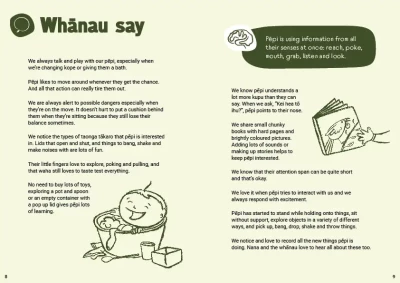
Watching and listening to baby
As babies develop, parents may need to distract them to change or bath them. Observing baby can help to understand them and what they need when they cry.
During this stage baby might be grabbing for things that aren’t safe, or trying to wriggle away when parents are trying to change or bath them.
This is a sign that they’re into a new stage of development. They’re curious and learning and are able to move in a way they haven’t been able to before.
Help parents to understand that their baby is not being ‘naughty’ but is developing. And as frustrating as that can be, we need to find ways to get the job done without punishing baby or getting angry with them over their normal (and necessary) development.
Ask whānau:
- Have you noticed anything like that?
- How have you been managing this?
Distracting baby
Distraction is still a great strategy during this period. Simple songs or fingerplay might be enough to distract the wriggler at nappy-changing time.
- What are your distraction techniques?
- What do you do when they don’t seem to be working?
Simple activities to connect with baby
In the Whakatipu Te Pihinga 2 (page 9), whānau describe how they’re watching and listening to their baby and respond with excitement when baby tries to interact with them.
Simple activities that parents do together with baby help to grow their connection with each other. They get to know each other better, and they find that even without words they can understand what pēpi wants – and maybe what they’d be saying if they could talk.
- Baby can’t say many words yet, so how do you figure out what they want?
Affirm their observations.
- How do they let you know what they like?
- What sort of things are they?
- What about when they’ve had enough?
- How do they let you know?
Crying
One clear way a baby expresses their wants and needs is by crying. Crying is a cue to let parents know their baby needs something.
- What have you noticed about baby’s cries?
- Do they have different types of cries?
Sometimes it’s hard to figure out exactly what a baby wants. If whānau miss baby’s cues and they don’t get their needs met, they can get easily stressed through crying too much.
Usually their needs are basic: they need food, sleep or a cuddle, or they’re wet, cold or uncomfortable. But if their crying won’t stop, it can become unbearable for parents, and it’s easy to ‘lose the plot’.
We know that shaking a baby through frustration can cause lifelong brain damage to the baby.
- Do you ever feel extremely frustrated with baby?
- What strategies do you use if you feel like you’re getting angry and might be ‘losing it’?
- What would you suggest to other parents who may be at risk of shaking their baby?












